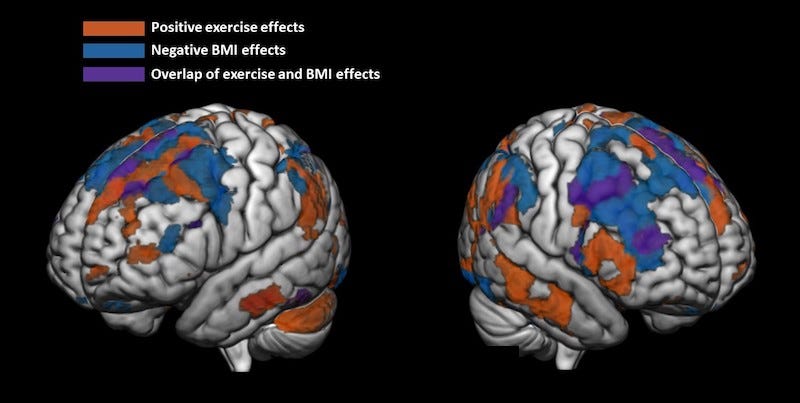Quick Hits
Daily brief research updates from the cognitive sciences

Ok, we all know by now that exercise is good for you. Many of you may also be more than aware that exercise is a potent stimulator for the brain encouraging brain growth and effective functioning. Read my article on brain health here.
Two pieces of research have recently been published which show, however, that not just exercise is good for you, but the timing is essential. Specifically, that exercise in pre-teens predicted the fitness of their brains later and also, by another piece of research, that exercise in childhood predicted healthy adult brains!
So, first off, the study from Boston Children’s Hospital shows that physical activity helps to organise developing brains. This study analysed brain imaging data from almost 6’000 9- to 10-year-olds and found that physical activity was associated with brains that were:
- More efficiently organised
- More robust
- Had more flexible networks
Basically giving kids fitter brains all round and better able to adapt to whatever challenges and cognitive functions come at them. Of note is that it didn’t matter what kind of activity — any physical activity is good.

This then leads us to separate recent study, nicely linking to the above, which looked at childhood pre-teen exercise and cognitive function in later life mapped to MRI data (214 participants aged between 26 and 69). This was conducted by a research group with Professor MATSUDA Tetsuya of Tamagawa University’s Brain Science Institute and Assistant Professor ISHIHARA Toru from Kobe University’s Graduate School of Human Development and Environment.
The results showed that
- People who are physically active during childhood (up to 12 years of age) have higher cognitive functions in later life.
- The positive association between childhood exercise and cognitive function could be seen in the modular segregation of brain networks, strengthened inter-hemispheric connectivity, greater cortical thickness, lower levels of dendritic arborisation and decreased density.
During early childhood the brain is at its most plastic and it seems that exercise optimises the networks and structures that are later used for multiple cognitive functions.
That’s good news, or maybe bad news. Bad news because they couldn’t find an association with cognitive functions and post-childhood physical activity. This is a surprise because there is a lot of research on the positive benefits of exercise — but it could be that these changes are only mild compared to the impacts on a developing child brain which set it up for life.
Got kids? Well, get them exercising!

Andy Habermacher
Andy is author of leading brains Review, Neuroleadership, and multiple other books. He has been intensively involved in writing and research into neuroleadership and is considered one of Europe’s leading experts. He is also a well-known public speaker speaking on the brain and human behaviour.
Andy is also a masters athlete (middle distance running) and competes regularly at international competitions (and holds a few national records in his age category).
Reference
More Quick Hits
No change for a century – children’s backgrounds still predict the same educational outcomes
Educational opportunities have changed dramatically for children over the last century – schools have changed, and college and university admissions have grown. Or so we might think at least. But according to a study out of the University of York, that is not the...
Behaviour at eight helps predict midlife health behaviours
A long-term study in Finland has tracked children from the age of eight until the age of 50 and a new analysis of the data, just published, has looked at some of the correlations between socioemotional behaviour in childhood and later life achievement and health...
Psychedelics and consciousness
Psychedelics change our conscious experience of the world – that is part of their attraction. Now a new study out of John Hopkins Medicine has analysed data on attributions of consciousness to other animals and innate objects by those using psychedelics and how this...
Lower smartphone usage increases wellbeing
So much has been said about smartphone usage in modern times. This ranges from some who say that they are destroying our brain to others who see they benefit our cognition by outsourcing cognitive heavy tasks like remembering lists of phone numbers – thereby freeing...
Modesty preferred for cooperative teams
In an age where it appears that many people are vying for self-esteem especially through social media, this research is interesting. Particularly in business contexts where cooperation is king. Research has previously shown that appearing to be wealthy increases...
Poverty shrinks babies’ brains
Quick HitsDaily brief research updates from the cognitive sciences couple of studies have just been released which look at the brains of newborns and young babies. The results are worrying for any society. Brain scans of newborn babies from...






